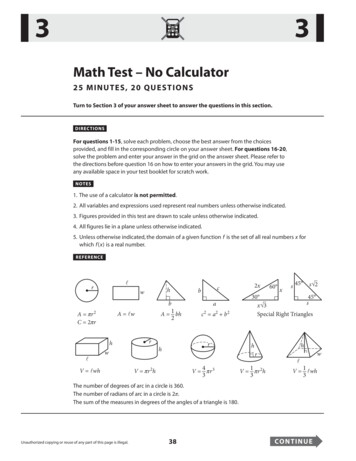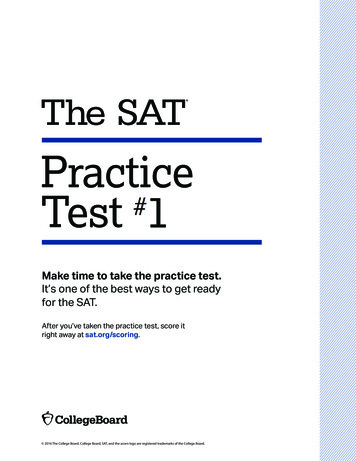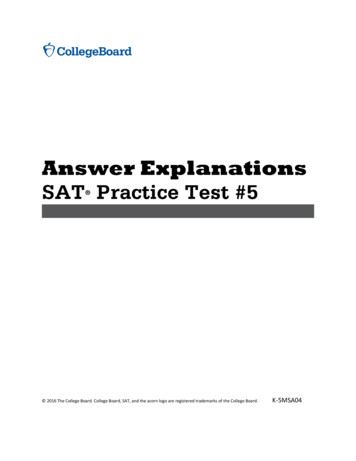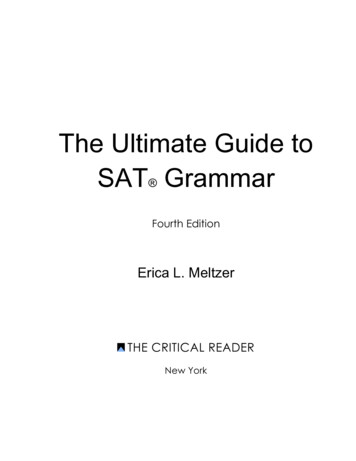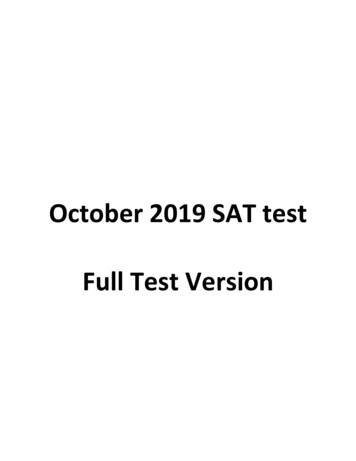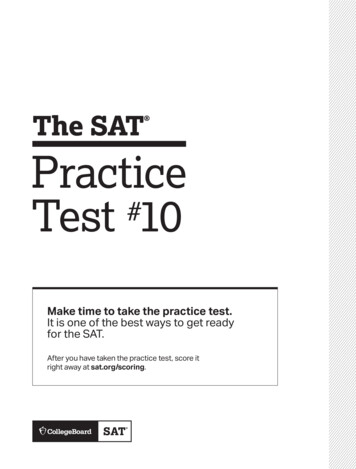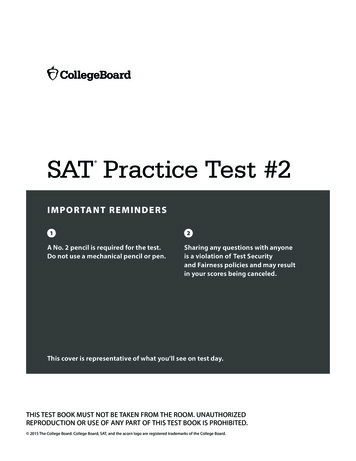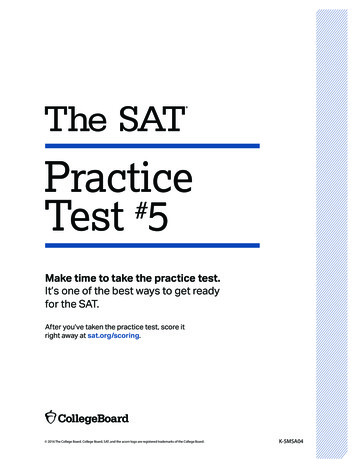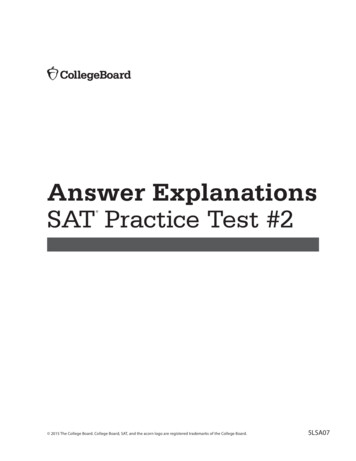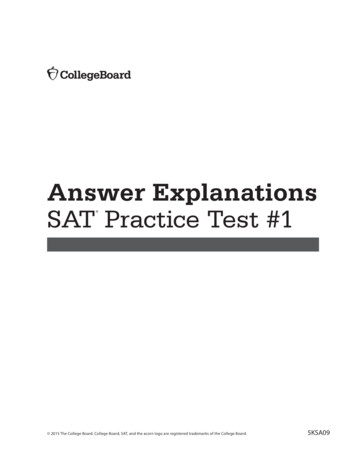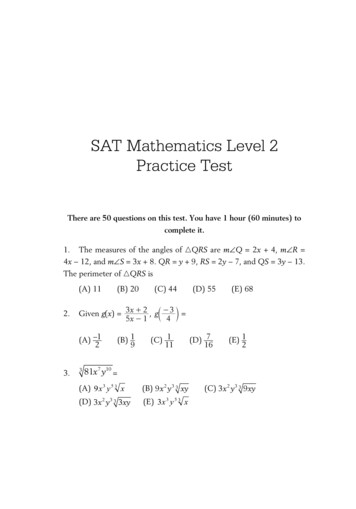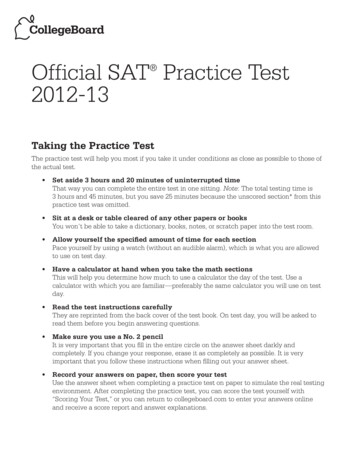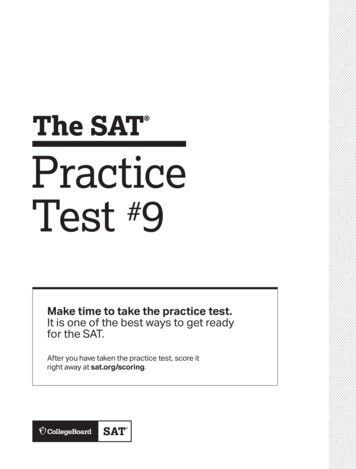
Transcription
The SAT Practice#Test 9Make time to take the practice test.It is one of the best ways to get readyfor the SAT.After you have taken the practice test, score itright away at sat.org/scoring.
THIS PAGE IS INTENTIONALLY LEFT BLANK.
Test begins on the next page.
11Reading Test6 5 M I N U TES, 5 2 QUESTIONSTurn to Section 1 of your answer sheet to answer the questions in this section.Each passage or pair of passages below is followed by a number of questions. After readingeach passage or pair, choose the best answer to each question based on what is stated orimplied in the passage or passages and in any accompanying graphics (such as a table orgraph).This passage is adapted from Amy Tan, The Bonesetter’sDaughter. 2001 by Amy Tan.Line510152025At last, Old Widow Lau was done haggling withthe driver and we stepped inside Father’s shop. It wasnorth-facing, quite dim inside, and perhaps this waswhy Father did not see us at first. He was busy with acustomer, a man who was distinguished-looking, likethe scholars of two decades before. The two menwere bent over a glass case, discussing the differentqualities of inksticks. Big Uncle welcomed us andinvited us to be seated. From his formal tone, I knewhe did not recognize who we were. So I called hisname in a shy voice. And he squinted at me, thenlaughed and announced our arrival to Little Uncle,who apologized many times for not rushing oversooner to greet us. They rushed us to be seated at oneof two tea tables for customers. Old Widow Laurefused their invitation three times, exclaiming thatmy father and uncles must be too busy for visitors.She made weak efforts to leave. On the fourthinsistence, we finally sat. Then Little Uncle broughtus hot tea and sweet oranges, as well as bamboolatticework fans with which to cool ourselves.I tried to notice everything so I could later tellGaoLing what I had seen, and tease out her envy. Thefloors of the shop were of dark wood, polished andclean, no dirty footprints, even though this wasduring the dustiest part of the summer. And alongthe walls were display cases made of wood and glass.Unauthorized copying or reuse of any part of this page is illegal.Unauthorized copying or reuse of any part of this page is illegal.426.Questions 1-10 are based on the followingpassage.2303540455055The glass was very shiny and not one pane wasbroken. Within those glass cases were our silkwrapped boxes, all our hard work. They looked somuch nicer than they had in the ink-making studioat Immortal Heart village.I saw that Father had opened several of the boxes.He set sticks and cakes and other shapes on a silkcloth covering a glass case that served as a table onwhich he and the customer leaned. First he pointedto a stick with a top shaped like a fairy boat and saidwith graceful importance, “Your writing will flow assmoothly as a keel cutting through a glassy lake.”He picked up a bird shape: “Your mind will soar intothe clouds of higher thought.” He waved toward arow of ink cakes embellished with designs of peoniesand bamboo: “Your ledgers will blossom intoabundance while bamboo surrounds your quietmind.”As he said this, Precious Auntie came back intomind. I was remembering how she taught me thateverything, even ink, had a purpose and a meaning:Good ink cannot be the quick kind, ready to pour outof a bottle. You can never be an artist if your workcomes without effort. That is the problem of modernink from a bottle. You do not have to think. Yousimply write what is swimming on the top of yourbrain. And the top is nothing but pond scum, deadleaves, and mosquito spawn. But when you push aninkstick along an inkstone, you take the first step tocleansing your mind and your heart. You push andyou ask yourself, What are my intentions? What is inmy heart that matches my mind?CO N T I N UECO NTI N U E
1657075I remembered this, and yet that day in the inkshop, I listened to what Father was saying, and hiswords became far more important than anythingPrecious Auntie had thought. “Look here,” Fathersaid to his customer, and I looked. He held up aninkstick and rotated it in the light. “See? It’s the righthue, purple-black, not brown or gray like the cheapbrands you might find down the street. And listen tothis.” And I heard a sound as clean and pure as asmall silver bell. “The high-pitched tone tells you thatthe soot is very fine, as smooth as the sliding banks ofold rivers. And the scent—can you smell the balanceof strength and delicacy, the musical notes of theink’s perfume? Expensive, and everyone who seesyou using it will know that it was well worth the highprice.”I was very proud to hear Father speak of ourfamily’s ink this way.1Which choice best summarizes the passage?A) A character’s arrival at her family’s ink shopsparks fond memories of her favorite aunt.B) A character’s surprise visit leads to a happyreunion at her family’s ink shop.C) A character comes to understand her father’sambitions while visiting her family’s ink shop.D) A character’s visit to her family’s ink shopdeepens her appreciation of her family’s work.2A main theme of the passage is thatA) family relationships should be nurtured.B) quality is achieved through deliberate effort.C) hard work results in material compensation.D) creativity needs to be expressed concretely.Unauthorized copying or reuse of any part of this page is illegal.Unauthorized copying or reuse of any part of this page is illegal.60133Throughout the passage, the narrator is portrayed assomeone who isA) reserved around unfamiliar people.B) attuned to her immediate surroundings.C) sympathetic to the needs of others.D) anxious about her responsibilities.4It can be most reasonably inferred from the passagethat Old Widow Lau’s reluctance to stay for tea isA) feigned, because she is not genuinely firm in herresolve.B) inconsiderate, because the family has beenplanning her visit.C) appropriate, because the shop is unusually busy.D) ill-advised, because she is exhausted from thejourney.5Which choice provides the best evidence for theanswer to the previous question?A) Lines 1-4 (“At last . . . first”)B) Lines 11-15 (“And he . . . customers”)C) Lines 15-18 (“Old . . . leave”)D) Lines 19-21 (“Then . . . ourselves”)6The narrator indicates that the contrast between theink-making studio at Immortal Heart village and herfamily’s ink shop is that the ink shopA) displays the family’s ink more impressively.B) is more conveniently located for the public.C) provides greater individual attention tocustomers.D) offers a larger space for presenting products.CO N T I N UECO NTI N U E427
1Based on the artistic philosophy expressed in thefourth paragraph (lines 46-59), it is reasonable toinfer that Precious Auntie would consider a hastilywritten first draft of a story to beA) emotionally raw and powerful.B) creatively satisfying for the author.C) essentially worthless in and of itself.D) inappropriately analytical for a piece of art.8Which choice provides the best evidence for theanswer to the previous question?A) Lines 46-48 (“As he . . . meaning”)B) Lines 49-50 (“Good . . . bottle”)C) Lines 52-55 (“You simply . . . spawn”)D) Lines 57-59 (“You push . . . mind”)Unauthorized copying or reuse of any part of this page is illegal.Unauthorized copying or reuse of any part of this page is illegal.428.7149As used in line 59, “matches” most nearly meansA) competes against.B) corresponds with.C) runs counter to.D) treats equally.10As used in line 68, “clean” most nearly meansA) complete.B) skillful.C) distinct.D) upright.CO N T I N UECO NTI N U E
1This passage is adapted from “How the Web AffectsMemory.” 2011 by Harvard Magazine Inc.Line5101520253035Search engines have changed the way we use theInternet, putting vast sources of information just afew clicks away. But Harvard professor of psychologyDaniel Wegner’s recent research proves thatwebsites—and the Internet—are changing muchmore than technology itself. They are changing theway our memories function.Wegner’s latest study, “Google Effects onMemory: Cognitive Consequences of HavingInformation at Our Fingertips,” shows that whenpeople have access to search engines, they rememberfewer facts and less information because they knowthey can rely on “search” as a readily availableshortcut.Wegner, the senior author of the study, believesthe new findings show that the Internet has becomepart of a transactive memory source, a method bywhich our brains compartmentalize information.First hypothesized by Wegner in 1985, transactivememory exists in many forms, as when a husbandrelies on his wife to remember a relative’s birthday.“[It is] this whole network of memory where youdon’t have to remember everything in the worldyourself,” he says. “You just have to remember whoknows it.” Now computers and technology as wellare becoming virtual extensions of our memory.The idea validates habits already forming in ourdaily lives. Cell phones have become the primarylocation for phone numbers. GPS devices in carsremove the need to memorize directions.Wegner points out that we never have to stretch ourmemories too far to remember the name of anobscure movie actor or the capital of Kyrgyzstan—wejust type our questions into Google. “We becomepart of the Internet in a way,” he says. “We becomepart of the system and we end up trusting it.”Working with researchers Betsy Sparrow ofColumbia University and Jenny Liu of the Universityof Wisconsin–Madison, Wegner conducted fourUnauthorized copying or reuse of any part of this page is illegal.Unauthorized copying or reuse of any part of this page is illegal.Questions 11-20 are based on the followingpassage and supplementary material.15404550556065707580experiments to demonstrate the phenomenon, usingvarious forms of memory recall to test reliance oncomputers. In the first experiment, participantsdemonstrated that they were more likely to think ofcomputer terms like “Yahoo” or “Google” after beingasked a set of difficult trivia questions. In two otherexperiments, participants were asked to type acollection of readily memorable statements, such as“An ostrich’s eye is bigger than its brain.” Half thesubjects were told that their work would be saved to acomputer; the other half were informed that thestatements would be erased. In subsequent memorytesting, participants who were told their work wouldnot be saved were best at recalling the statements. Ina fourth experiment, participants typed into acomputer statements they were told would be savedin specific folders. Next, they were asked to recall thestatements. Finally, they were given cues to thewording and asked to name the folders where thestatements were stored. The participants provedbetter able to recall the folder locations than thestatements themselves.Wegner concedes that questions remain aboutwhether dependence on computers will affectmemories negatively: “Nobody knows now what theeffects are of these tools on logical thinking.”Students who have trouble remembering distinctfacts, for example, may struggle to employ those factsin critical thinking. But he believes that the situationoverall is beneficial, likening dependence oncomputers to dependence on a mechanical hand orother prosthetic device.And even though we may not be taxing ourmemories to recall distinct facts, we are still usingthem to consider where the facts are located and howto access them. “We still have to remember things,”Wegner explains. “We’re just remembering adifferent range of things.” He believes his study willlead to further research into understanding computerdependence, and looks forward to tracing the extentof human interdependence with the computerworld—pinpointing the “movable dividing linebetween us and our computers in cyber networks.”CO N T I N UECO NTI N U E429
1150454035302520151050reman emd befo rld staer telo mreca enmtio tseno mnst f beol r sde taremr l tememoc eat ntbeio srfnsolno dert s lota cate tiom nreen smtsembernothingPercent of participantsResults of Experiment 4: Memoryof Statements and Folder LocationsAdapted from Betsy Sparrow et al., “Google Effects on Memory: Cognitive Consequences of HavingInformation at Our Fingertips.” 2011 by American Association for the Advancement of Science.The main purpose of the passage is toA) describe a series of experiments on the waytechnology interferes with critical thinking.B) assert that people have become overly dependenton computers for storing information.C) discuss the idea that humans’ capacity formemory is much weaker than it once was.D) share the findings of a study examining the effectof computer use on memory recall.Unauthorized copying or reuse of any part of this page is illegal.Unauthorized copying or reuse of any part of this page is illegal.430.11612Which choice best supports the idea that reliance oncomputers
various forms of memory recall to test reliance on computers. In the first experiment, participants demonstrated that they were more likely to think of computer terms like “Yahoo” or “Google” after being. 45. asked a set of difficult trivia questions. In two other experiments, participants were asked to type a collection of readily memorable statements, such as “An ostrich’s eye is .
